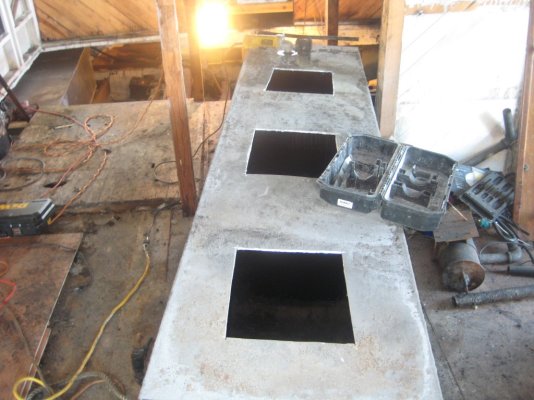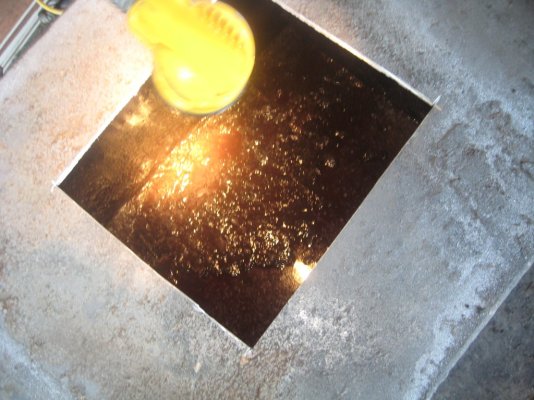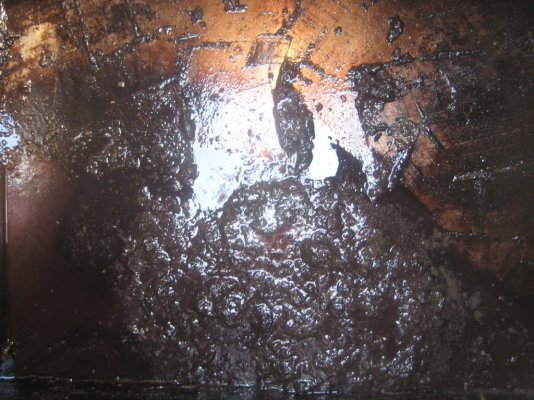You are using an out of date browser. It may not display this or other websites correctly.
You should upgrade or use an alternative browser.
You should upgrade or use an alternative browser.
cleaning fuel tanks
- Thread starter dannyboy
- Start date
The friendliest place on the web for anyone who enjoys boating.
If you have answers, please help by responding to the unanswered posts.
If you have answers, please help by responding to the unanswered posts.
Keith
Guru
- Joined
- Oct 5, 2007
- Messages
- 2,715
- Vessel Name
- Anastasia III
- Vessel Make
- Krogen 42
Can you get in there and physically clean it out? Lacquer thinner is a mix of solvents that is very powerful and you could use that. If you need to install ports, you can use these: http://www.seabuilt.com/.
Yesterday, had a call from a sailboat from Texas here in the Tampa Bay area that needed his tank cleaned (had real heartaches coming across the Gulf).
We cut in two 6" Seabuilts and found globs of micro-bio growth in his tank. By the way, he had his tank cleaned in Texas in early November. They pulled the fuel sender and pulled the fuel from there and returned in the deck fill. They were happy that their*system could separate cream from milk.
FWIW, Startron makes a very good tank cleaner.
We cut in two 6" Seabuilts and found globs of micro-bio growth in his tank. By the way, he had his tank cleaned in Texas in early November. They pulled the fuel sender and pulled the fuel from there and returned in the deck fill. They were happy that their*system could separate cream from milk.
FWIW, Startron makes a very good tank cleaner.
BruceK
Moderator Emeritus
- Joined
- Oct 31, 2011
- Messages
- 13,347
- Vessel Name
- Sojourn
- Vessel Make
- Integrity 386
Would it be advisable, if possible, to install a drain tap for sediment and water, located below the pick up point, for when the tanks are refitted?
BruceK
BruceK
FF
Guru
- Joined
- Oct 12, 2007
- Messages
- 22,552
Tanks that are out cam easily be cleaned with 5gal of ZEP industrial cleaner , shaking (or an air hose) and time.
Adding a drainable sump would be a great first step in adding reliability to the fuel system
Adding a drainable sump would be a great first step in adding reliability to the fuel system
*FF wrote:
Adding a drainable sump would be a great first step in adding reliability to the fuel system
Yes it would but for some reason, I've never seen or heard of one on a boat.* I remember some cars in the 1950s had rhem.
RickB
Guru
- Joined
- Oct 20, 2007
- Messages
- 3,804
- Vessel Make
- CHB 48 Zodiac YL 4.2
It amazes me that so many people are frightened out of their shorts by the idea of having propane on a boat but suggest things like this.Keith wrote:
Lacquer thinner is a mix of solvents that is very powerful and you could use that.
Leaving aside all the health issues related to breathing the fumes of this chemical cocktail, the flash point is 20*F and the Lower Explosive Limit is 1 percent, that is less than half the LEL of propane.
Lacquer thinner fumes are twice as heavy as air, propane is only 1.5 times as heavy. Propane gas is less likely to explode and is more easily dissipated with ventilation than lacquer thinner fumes.
Would anyone here be happy to spray the sides of their fuel tanks with propane if the stuff cleaned off crud? No? Why not? Propane is a very effective solvent. It is used in the refining industry to remove asphaltenes (the black crud you find in the bottom of diesel fuel tanks) from lube oil feed stocks.
Think about what products you use on your boat and be very very careful about some of the advice you get here.
-- Edited by RickB on Sunday 11th of December 2011 07:11:13 AM
Codger2
Guru
- Joined
- Oct 11, 2007
- Messages
- 6,691
- Location
- US
- Vessel Name
- Circuit Breaker
- Vessel Make
- 2021..22' Duffy Cuddy cabin
RickB wrote:
Think about what products you use on your boat and be very very careful about some of the advice you get here.
________________________________________________________
I wrote about this subject a few years ago and it still scares me today! Don't get me wrong...I am not a boat maintenance expert by any means. I am a yachtsman (Moonstruck's definition.) and hire my work out. I am, however, always at the boat when the pros are working on it and, by osmosis, have gleaned quite a bit of information. Be really careful of some of the advise you get here. Check it out with a few knowledgeable sources. It's all well intended but very wrong in a lot of cases.
BruceK
Moderator Emeritus
- Joined
- Oct 31, 2011
- Messages
- 13,347
- Vessel Name
- Sojourn
- Vessel Make
- Integrity 386
*rwidman wrote:FF wrote:
Adding a drainable sump would be a great first step in adding reliability to the fuel system
Yes it would but for some reason, I've never seen or heard of one on a boat.
*My tanks have a screw in plug at the bottom (plus side access plate with set screws); if I unscrew the plug without emptying the tank the flow is uncontrolled so a drain valve makes sense. Author Nigel Calder says they`re a must. Could gumming up be a reason not to fit one, otherwise why not?
dwhatty
Moderator Emeritus
- Joined
- Sep 25, 2008
- Messages
- 2,846
- Location
- USA
- Vessel Name
- "Emily Anne"
- Vessel Make
- 2001 Island Gypsy 32 Europa (Hull #146)
Our boat's tanks have sumps with valves on which the outlets are capped. Simply unscrew a cap, crack open a valve, drain a bit into a clear container for inspection. That's one thing at least the builder did correctly. On the other hand, the tanks have plastic sight tubes with no valves on them which scares me.
C lectric
Guru
dwhatty beat me to it. The only things I would consider adding is use a locking ball valve and the fittings should be 316 SS in aluminum tanks since there could be water in contact with the tank body and the fittings. Hope no water but protect the tank
Phil Fill
Guru
- Joined
- Oct 11, 2007
- Messages
- 2,919
- Location
- US
- Vessel Name
- Eagle
- Vessel Make
- Roughwater 58 pilot house
SS tanks are usually not recommended for fuel tanks as they do not like stagnant fluids.* SS are mostly used for water tanks.**

*
If the tanks have baffles inside cleaning cut inspection holes to clean/reach the entire tank.* I would use something that is water salable/non flammable, then wet vac out, and the blow air into the tank to evaporate the moisture. **I clean/repair one of our 400 gallon tanks by cutting a 18 X 18 hole and climbed inside to clean/weld/paint the inside.

*
If the tanks have baffles inside cleaning cut inspection holes to clean/reach the entire tank.* I would use something that is water salable/non flammable, then wet vac out, and the blow air into the tank to evaporate the moisture. **I clean/repair one of our 400 gallon tanks by cutting a 18 X 18 hole and climbed inside to clean/weld/paint the inside.
BruceK
Moderator Emeritus
- Joined
- Oct 31, 2011
- Messages
- 13,347
- Vessel Name
- Sojourn
- Vessel Make
- Integrity 386
Slightly off topic but may be helpful, I removed some water and sludge from the bottom of a tank using plastic tube tied to a length of dowel inserted via the filler to the tank base,pumping out with a hand pump (one for draining oil via the dipstick hole)until the stuff coming up looked like diesel.
BruceK.
BruceK.
jleonard
Guru
- Joined
- Jun 25, 2008
- Messages
- 5,063
I did something very similar using an outboard engine squeezeball rig after "listing" the boat to get the water into an accessable corner of the tank.
We recently cut in two 6" Seabuilt's for a customer at his request. While his tank was professionally polished 15 day prior, his crossing of the Gulf from Texas was a bit taxing with filter changes.
What we removed from his tank was enough to chock a horse. Again the difference in fuel polishing and tank cleaning.
What we removed from his tank was enough to chock a horse. Again the difference in fuel polishing and tank cleaning.
RickB
Guru
- Joined
- Oct 20, 2007
- Messages
- 3,804
- Vessel Make
- CHB 48 Zodiac YL 4.2
*Now there is an oxymoron!El Sea wrote:*his tank was professionally polished
jleonard
Guru
- Joined
- Jun 25, 2008
- Messages
- 5,063
CCC you are too funny!!
Do you rent your friend out? Just wonderin'

Do you rent your friend out? Just wonderin'
BruceK
Moderator Emeritus
- Joined
- Oct 31, 2011
- Messages
- 13,347
- Vessel Name
- Sojourn
- Vessel Make
- Integrity 386
*Judged by his nose, it looks more like Rudolf.charles wrote:
that is RANDOLPH inside the tank.
*
BruceK
I have used Soltron for years.**It works well.**Ohers I*know*have also used it for*years... they swear by it too.* Cleans tanks and keeps em clean.* Improves fuel burn.* Stabilizes fuel held for long durations.* Very affordable!* Following website has loads of info.* Good Luck!
http://www.soltron-gtr.com/english.htm
http://www.soltron-gtr.com/english.htm
Keith
Guru
- Joined
- Oct 5, 2007
- Messages
- 2,715
- Vessel Name
- Anastasia III
- Vessel Make
- Krogen 42
Ditto on the Soltron. Starbrite started carrying it as Startron, easy to find at West Marine and others.
Charlescharles wrote:
I add to this discussion,, for the benefit of any novice boater, that no matter how many and much additives that one adds to diesel fuel that will NOT CLEAN THE TANK, period. It may clean the fuel but the crud is still on the bottom of the tank and in a rough sea it will get into suspension and the cleanest of fuel will pick that up and into the filters it goes.
Same for "fuel polishing" polish all you want but the crud is in the bottom. That must be removed by some means. Then keep the fuel clean.
JUst a heads up
In similarity to as you mention, it is also my belief that if a fuel tank is toooo thicky filled (coated) with too-old crap on its bottom or walls then it is only that opening it up for hand scraping will be the best action to take.* But, if the tanks crud is not too thick, nor been there too many years (I do not know how to accurately approximate either of those measurements), then there are fuel additives that can actually clean the inside of a tank and fuel line as well as to keep them clean and increase the duration of*fuel stability thereafter.* There are intricacies too specific to address in this post regarding some forms (i.e. Toluene - toxic*chemical) of liquid insertion for tank cleaning... but, I have found Soltron does work and is very simple/safe/affordable to regularly use.**Suggestions:
Soltron: http://www.soltron-gtr.com/english.htm Entire site has really interesting stats etc.* Ive found that Soltron has cleaned the interior of my gasoline tanks, fuel lines and carburetors, then kept them clean.* It also allows me to keep gasoline for long durations without experiencing problems of it getting stale.* I understand it works amply well with diesel and other fuel types.
Visit Soltron FAQ link at page top... then punch up:
-***** What benefits can be expected from using Soltron Enzyme Fuel Treatment?... then read popup box, especially center area
-***** Why will Soltron be different than any other fuel treatments I have used before?... then read popup box, especially from the center down
Toluene: For aggressive liquid cleaning action (one with considerable intricacies regarding application and finalization, and, not necessarily to be used as a fuel additive, but rather as a standalone product) Ive found there is virtually no fuel propagated tank buildup or crud that Toluene (a very hazardous chemical) will not eventually breakdown and emulsify to enable various means of the cruds removal.* I do not recommend any novice to use Toluene unless an experienced person is available.* There are several handling precautions/procedures that should be followed. See CAUTION below.
CAUTION Toluene Hazards Identification:
Potential Acute Health Effects:
Hazardous in case of skin contact (irritant), of eye contact (irritant), of ingestion, of inhalation. Slightly hazardous in case of skin contact (permeator).
Potential Chronic Health Effects:
CARCINOGENIC EFFECTS: A4 (Not classifiable for human or animal.) by ACGIH, 3 (Not classifiable for human.) by IARC.* MUTAGENIC EFFECTS: Not available. TERATOGENIC EFFECTS: Not available. DEVELOPMENTAL TOXICITY: Not available. The substance may be toxic to blood, kidneys, the nervous system, liver, brain, central nervous system (CNS).
Repeated or prolonged exposure to the substance Toluene can produce target organs damage
*
psneeld
Guru
for the gasser boats...regular ethanol fuel cleans the tank all by itself VERY well.* Once phase separation occurs or you get a big slug of water (meaning separation soon to follow)...that has to be removed and cleaned though.
I'm sure lightly crudded diesel tanks could be cleaned with an additive...but I would never run it though my diesel.* Most additives dilute diesel lubricity (no matter what most boaters, additive manufacturers, mechanics, old timers, etc...etc tell you) so I would only clean my tanks as a separate action to running clean fuel with one of a handfull of additives through my engine.
I'm sure lightly crudded diesel tanks could be cleaned with an additive...but I would never run it though my diesel.* Most additives dilute diesel lubricity (no matter what most boaters, additive manufacturers, mechanics, old timers, etc...etc tell you) so I would only clean my tanks as a separate action to running clean fuel with one of a handfull of additives through my engine.
Hi Scottpsneeld wrote:
for the gasser boats...regular ethanol fuel cleans the tank all by itself VERY well.* Once phase separation occurs or you get a big slug of water (meaning separation soon to follow)...that has to be removed and cleaned though.
I'm sure lightly crudded diesel tanks could be cleaned with an additive...but I would never run it though my diesel.* Most additives dilute diesel lubricity (no matter what most boaters, additive manufacturers, mechanics, old timers, etc...etc tell you) so I would only clean my tanks as a separate action to running clean fuel with one of a handfull of additives through my engine.
I clearly see from your posts that you have a lot of marine background, i.e. learned experience.* Much you say hits nail on head, I read your input carefully.*
Regarding Soltron fuel additive, I wonder if you could take time to carefully examine the in-depth info on Soltrons website and give us your unbiased opinion on what attributes you feel Soltron might provide?* In the site there is much they profess; with seemingly good stats and backup. http://www.soltron-gtr.com/english.htm
Ive had years of really good results by utilizing Soltron with gasoline rigs*and have had many gas as well as diesel boat owners on several forums and at boatyards also speak highly of Soltrons capabilities for apparatus cleaning and fuel stabilization.* To date Ive not heard one Soltron user say negative things and most greatly applaud its results after using it for years.* Many who have never used Soltron and therefore have not experienced its results down play it, I guess from lack of practical knowledge.
Any input you can provide on this is appreciated!
Thanks! Art*
*
FF
Guru
- Joined
- Oct 12, 2007
- Messages
- 22,552
With today's lower sulfur diesel fuels, will tank crud become less of an issue?
Long term yes , but short term as the glop is stripped from the tank walls a pre filter and a few cases of filters might be a good idea.
This might be a good use of one of the tiny filer setups that run 24/7 while on the power hose , dockside.
Long term yes , but short term as the glop is stripped from the tank walls a pre filter and a few cases of filters might be a good idea.
This might be a good use of one of the tiny filer setups that run 24/7 while on the power hose , dockside.
Tom.B
Moderator Emeritus
- Joined
- Jul 30, 2009
- Messages
- 5,839
- Location
- USA
- Vessel Name
- Skinny Dippin'
- Vessel Make
- Navigator 4200 Classic
*I thought silicone was bad? I was thinking about this stuff because my inspection plate actually holds back fuel.charles wrote:
RTV BLUE
The ONLY gasket sealer(maker) that I carried on the boat. It seals where no other does.. Of course this is only my EXPERIENCE and not speculation!!!
I replaced a water pump gasket on my Perkins using this with NO gasket, infact did it on both engines.
http://www.grainger.com/Grainger/HYLOMAR-Polyurethane-Based-Sealant-2VUV5?Pid=search (new window)
Opinions?
-- Edited by GonzoF1 on Saturday 31st of December 2011 09:09:05 PM
Similar threads
- Replies
- 75
- Views
- 6K
- Replies
- 11
- Views
- 1K



